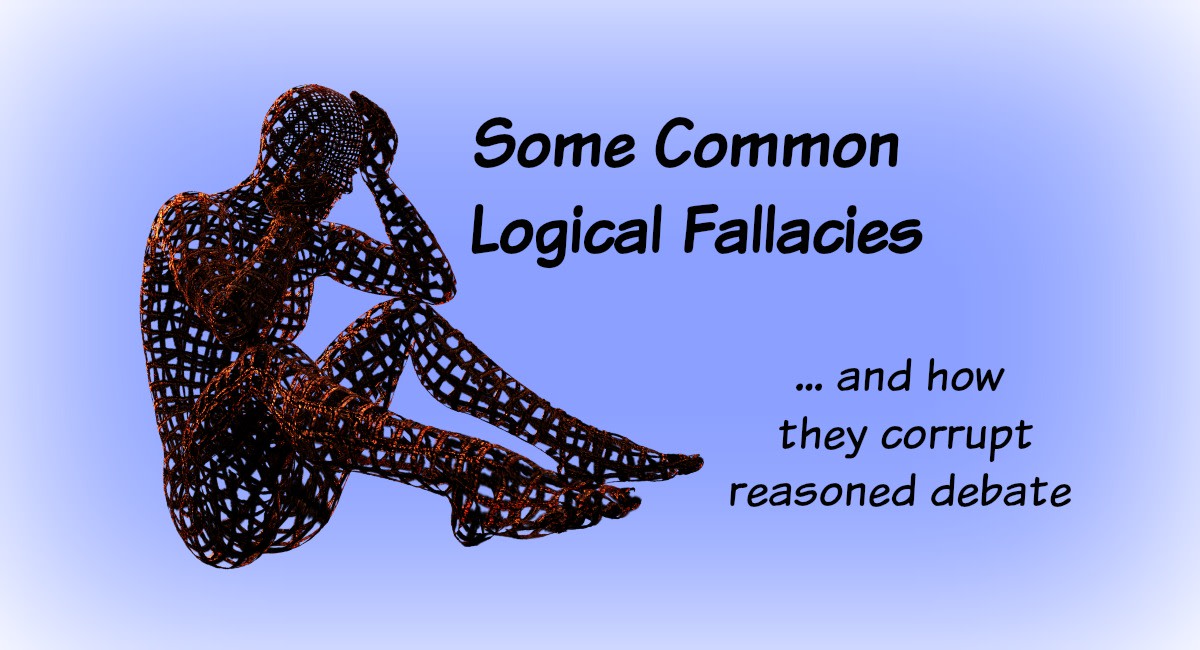The Limits of Logic: A Meditation

Let me start by stating that I am writing from the perspective of a native-born U.S. citizen, who speaks American English (as opposed to British-style English) and only American English.
I am writing this as someone who has become somewhat embittered by the way that, shall we say, certain people seem to use language, not to inform or illuminate, but to obscure, mislead, if not outright deceive.
I write this as a kind of "pointer," after a fashion, for young people who may be striking out on the workforce for the first time. I just mean to offer a little something to be on the look out for.
For instance, I once saw an ad in a newspaper for a job---the company shall remain nameless. The primary reason I applied for the job was the words, "Tuition assistance available." This nameless company may have run commercials on television boasting tuition assistance as one of the features that makes working there an attractive option.
In one shot you'll see people working and then cut away to a bunch of people wearing caps and gowns. The idea is that the company is interested in "developing the whole person," and all that.
Now, to a person of good faith, the words, "tuition-assistance available" means tuition-assistance available. It means that one may have to work there for a few months before becoming eligible, perhaps. But after that you can walk into the human resource office, tell them what school you're planning to attend and all that, fill out some paperwork, and then get the benefit.
I applied for and got the job. But I was immediately disappointed to learn that I could not get the tuition-assistance benefit because I was not working on the right shift to get it. The benefit was available to people who worked on a certain shift, which, of course had not been mentioned in the ad. The "fine print" had been so small that it wasn't there.
So what does the word "available" mean? Or, perhaps it is more precise to say: What can the word "available" be obscured to mean?
Well, in the context of the job I mentioned, it certainly did not mean readily accessible.
It did not mean an automatically guaranteed benefit.
It did not mean universally accessible, regardless of the "shift" one works on.
What available seemed to mean in the context of the job I'm referring to was: You can, maybe, get the benefit, if and only if you apply when the blind crow flies backward over the harvest moon, when solar flares strike Jupiter, provided Pluto becomes a planet again---if you're standing on your right leg at the time.
Available seemed to mean that a benefit was floating in the ether somewhere. You may be able to access it, if you approach it in a certain precise way, from a certain precise position.
You know, I remember watching a documentary on "The Jackson Five,"/"The Jacksons"/Michael Jackson on ShowTime. Reference was made to an incident in which the group put out an album, and it boasted "all songs written by the Jacksons."
Well, it was explained that a songwriter from England, a white man with the last name Jackson did some work on the album. Cute, right? "They didn't lie."
I PERSONALLY HATE STUFF LIKE THAT!
That brings us to the following little exercise of True or False. Ready?
If all apes are cute and John is an ape, then John is cute. True or False
Let me say this: Under normal good-faith circumstances there are "obvious" assumptions we would make; and we would usually give the answer "yes"---if all apes are cute and John is an ape, of course "it stands to reason" that John is cute.
But that is not how it works in the formal discipline of logic. I understand a course in logic is thought to be useful for people who intend to go into the legal profession.
Once again: If all apes are cute and John is an ape, then John is cute. True or False.
The first thing to say is that the statement is not necessarily true.
1. We need to be certain that John the ape is one and the same as John the cute.
2. That is to say, we need to know, whether or not, a second "John" has been introduced.
3. For all we know, the John on the left of the "then" may be a different John than the one on the right of the "then."
4. As it stands, for all we know, John the cute, on the right side of the "then" may be a cat. And this second "John" may make a decidedly un-cute cat.
5. As it stands, we really have no way of proving or knowing the statement to be either true or false.
6. On the other hand, if there is a "second" John, and he is a cat, and he is a cute cat at that, then what?
If all apes are cute and John is an ape, and John the cat is cute, then John is cute. True or False
- We have an ape named John that is cute, as are the whole of his species.
- We have a cat named John that is cute. So, is "John" cute?
- The problem is that we do not know whether or not a third "John" has been introduced.
- For all we know, a third John could have been introduced; and let's say the third John is another cat.
- The hypothetical third John, which is the second John the cat---may or may not be cute---because the universal cuteness of felines has not been established.
- Again, the statement is not necessarily true because we have no way to prove the statement true or false.
- Or, the hypothetical third John might be a rhinoceros. The problem is we don't know.
Let's try another one.
If "some" of the world's herbivores are apes, then "all" apes are herbivores. True or False
I think its safe to say, from the perspective of both common sense and formal logic, that the statement is true.
1. There are many species of life on the planet Earth.
2. "Some" of those species are herbivores.
3. Some of those "some" happen to be apes.
4. Therefore "all" apes are herbivores. After all, we wouldn't expect some apes over here to be doing the Atkinson diet, and some apes over there going gluten-free... and so on. As far as I'm aware, animals other than humans do not exhibit that kind of internal dietary variety.
Let's do it again
If all actors are great and Steve is an actor, then Steve is great. True or False.
First of all, normal people do not speak in absolutes like this. But for the purposes of formal logic, that statement appears to be straightforwardly true. We have established the universal greatness of actors; and Steve, as a thespian, therefore necessarily shares the characteristic of greatness.
If all actors are great and Steve is great, then Steve is an actor. True or False
Again, there is nothing that says that "Steve [the] actor" and "Steve [the] great" are necessarily one and the same person.
A. We know that greatness derives from the acting profession.
B. But we do not know that the acting profession is the sole source greatness. "Steve [the] great" could be a plumber or piano tuner or cabinetmaker.
One more time
If all actors are named Steve, then all people named Steve are actors. True or False.
Such a statement could be true, if and only if we were living in a world in which profession was determined by birth name.
The HIV virus causes AIDS, therefore anyone who has HIV has AIDS. True or False
We know that to be factually false (ask Magic Johnson) and it does not follow logically. HIV causes AIDS. HIV's causal mechanism may or may not be activated.
You know, one time I applied for a job---again the company shall remain nameless---which boasted a huge banner out front that said the words NOW HIRING!
You would think the words, "Now Hiring," would actually mean "Now Hiring." It turns out that is not what those words meant in the situation I am recalling. They did not mean: We're accepting application for review and we'll call the candidates we're interested in interviewing and make our selections.
No! What those words actually meant, in that context, was this: We are taking applications of people who are not currently working to hold on reserve, so that when our staff drops off, as we anticipate to, a couple of months from now in the spring, we will have people to call to fill those positions.
At least, that's what the man told me.
Make up to $3500 a week selling Hokum door-to-door!
1. First of all, the words "up to," let you know that the $3500 a week, is an internally conceived ceiling of potential earnings.
2. Secondly, the statement itself is an exhortation, a motivational trope, not a promise.
Again...
If gymnasts are agile athletes, then agile athletes are gymnasts. True or False.
Now, the common sense answer to that is false. That is because we all know that, as amazing as gymnasts are, they do not hold a monopoly on agility.
However, because of deviousness the "logical" answer is true. That statement is logically true because its like saying: If 2 + 3 = 5, then 3 + 2 = 5
If "athleticism" (2) and (+) "agility" (3) gives you (=) a "gymnast" (5); then of course it is the case that "agility" (3) and (+) "athleticism" (2) gives you (=) a "gymnast" (5)...
Because, you see, a "gymnast" (5) is comprised of (=) a person with "agility" (3) and (+) "athleticism" (2); Or...
Again, a "gymnast" (5) is comprised of (=) a person with "athleticism" (2) and (+) "agility" (3).
What if we state the problem a different way:
If gymnasts are agile athletes, then all agile athletes are gymnasts. True or False.
We can safely say, logically, that the statement is false. Why?
Because we never established, on the left side of the word "then," that gymnastics is the sole source of agility in athletes. On that left side of "then," we only established that "agility" is a feature of gymnastic athletes.
Why did I say, "because of deviousness the 'logical' answer is..." before?
Because when you think about it, "logic" is an escape hatch to avoid responsibility or accountability. It presupposes an artificial mode of Being.
What do I mean by that?
Do you remember the sitcom The Brady Bunch? That is the show about the blended family: a man and his three boys from a previous marriage (Mike Brady); and a woman and her three daughters from a previous marriage (Carol Brady); and don't forget the housekeeper (Alice).
I don't remember any of the details, but there was an episode in which the oldest son, Greg, was supposed to get in trouble for something. Again, I don't remember any details, but Greg had violated his father's injunction not to do something---or, not to do something beyond certain parameters.
Well, when the father saw Greg, he attempted to hold his eldest child to account, make him explain himself as to why he had disobeyed.
Instead of doing the right thing---which would have been to hang his head in shame, tell his father that he was sorry and that he had no excuse for his behavior, and promise never to let it happen again---he brought the "shyster" lawyer routine into their home, resorted to a "logical," and therefore narrow, literal interpretation of his father's original injunction.
Does all that make sense? Are you still with me?
Good!
Mike Brady, the father, said that Greg, his son, had known perfectly well what he had meant over and above the relatively narrow, literal scope of his words of prohibition. Greg clung to his artificial, "logical" position with tenacity, insisting that all there is, is the "letter of the law," as it were, not the "spirit of the law," as well.
In this way, Greg wriggled out of accountability. His father, reluctantly (and with no small amount of exasperation) conceded the point. But there is another law called "turnabout is fair play."
If this kind of artificial literalism was the way Greg wanted to play it, his father would oblige him.
Well, suffice it to say, that Greg didn't find it so pleasant when the "shoe was on the other foot," so to speak. Twenty-three minutes later, family harmony was restored when Greg decided he should stop acting like a damn fool, shunt aside his logical literalism, and act like a human being again; and I believe he accepted his just punishment for his original transgression, if I "remember" correctly.
So, in many ways, the discipline of "logic" is a resort to an artificial literalism, as a passage for evasion and obfuscation.
A principle: We human beings can never put everything we mean into words alone. We oftentimes mean more than we say with our words alone. That is why there is such a thing as the "spirit of the law," for example.
But words can also be "logically" or literally deployed to promise much less than is ever intended.
Four More "Equations"
If an effective mayoralty is determined by job creation, then Mike, who created 100 jobs, was a more effective mayor than his predecessor, Bill, who only created 50 jobs. True or False
This statement is logically true. We have established the criteria for an effective mayoralty as job creation. Therefore, since Mayor Mike "created" 100 jobs, to Bill's 50 jobs, we have to say that Mike was the more "effective" mayor.
But here's the thing: That statement is technically accurate. But there are a few complications that make the statement not necessarily true.
What I am sayings is:
1. Sometimes accuracy and the truth do, indeed, go hand-in-hand; and there is no contradiction.
2. But other times accuracy and truth can be and are mutually exclusive.
3. That is to say, a statement can be (logically) accurate but not true.
Let's look at the logically true statement again: If an effective mayoralty is determined by job creation, then Mike, who created 100 jobs, was a more effective mayor than his predecessor, Bill, who only created 50 jobs.
A. To start with, what does the word create mean? Create means to cause a thing to come into existence, which had not existed before---anywhere before.
B. In the politics of the United States of America---which is what I'm talking about---we don't do job "creation" in the FDR/New Deal/Public Works program sense. Our politics are too far to the Right for that at the moment.
C. Point B is the only way government can ever "create" jobs, in the sense of fulfilling the actual meaning of the word create.
D. Cities and states have bureaucrats called economic development officers. Their job is to go to corporations in other cities or other states, and persuade those entities to relocate a branch or division to their city or state. In this way they move jobs around, without "creating" them (1).
E. We can say that Mike's administration were better dealmakers than Bill's.
F. Okay, even using that revised definition, can't we still say that Mike---who brought 100 jobs to the city---was a more effective mayor than his predecessor, Bill, who only brought 50 jobs?
- In a narrow, technical sense, we can indeed say that Mike's deal making was more impactful or effective (in that it had a greater quantitative effect) than Bill's.
- That would mean, then, that Mike's administration was more quantitatively impactful (or had greater numerical effect) on the city's employment picture.
- But on the other hand, out-of-town or out-of-state deal making is something other and apart from the actual administration of the city government. It is not using available resources to make the government more efficient or make life better for the citizens.
- Even though more jobs is a good thing, job "creation" by way job shifting is inherently unstable; because what you have taken away from one community through one kind of deal---can be taken away from you by someone else making another kind of deal.
- We cannot, therefore, determine mayoral effectiveness on the yardstick of supposed job "creation" alone.
If minimal corporate tax levels are generative of maximum employment levels, then tax cuts will lead to job creation. True or False
1. We have established a causal relationship between minimal corporate taxation as generative of maximum employment levels.
2. For the purposes of the equation, we are saying that maximum employment levels are directly dependent upon minimal corporate taxation.
3. In this equation we are not ascribing correlation to minimal corporate tax rates and maximum employment levels; we are insisting upon causation---again, for the purposes of the equation.
4. Therefore, the statement is logically true. It is also politically true in the United States of America today, with its Right-leaning politics.
The statement is logically accurate. But is it actually and effectively true?
Question: Do corporate tax cuts directly lead to the "creation" of more jobs?
The Short Answer: It depends on what you mean by "creation" and "jobs."
Example:
Suppose my company made $100 by the end of last quarter; and I project it will make the same by the end of next quarter.
That is to say, my company's profits are $100, which come from the manufacture and sale of, let's say, pogo sticks.
At my present employment level, in production and retail---let's say, for simplicity's sake I manufacture and sell my own pogo sticks---I have made $100 at the end of last quarter; and I project my profits to be the same for the end of next quarter.
But let's say, as a "pleasant surprise," my next quarter's profits are $150. But the extra $50 came from government subsidies and tax cuts.
But still $50 is $50, right?
- Since I have made an additional $50 profit, above what I had projected, does this mean that there is, out there, an additional $50 worth of demand for my pogo sticks?
- No.
- Does this mean that I can "create" $50 worth of additional employment on the production and sales side?
- No.
The demand for my pogo sticks has remained the same from one quarter to the next: $100 worth and the employment level to meet it.
Since the $50 came from government subsidies and tax breaks, I can use that money to hire lawyers, accountants, and lobbyists.
One Ring: The lobbyists to advocate on my behalf for greater government subsidies and tax breaks and concessions.
One Ring: The accountants to differentiate profit streams, so that I will not do something stupid like take $200 worth of profits and create $100 worth of additional "jobs," when the other $100 came from the effectiveness of my lobbyists in getting me more subsidies and tax breaks and concessions.
One Ring: Tax lawyers to help me maximize the benefit of my lobbyist-driven profits and "take advantage of the current political and legal environment to minimize, to the fullest extent, my tax obligations." Yada, yada, yada... Heaven forbid we accuse anybody of tax evasion or anything....
In this sense, "jobs" are "created." Of course, these lobbyists, accountants, and tax lawyers are, presumably already, technically employed. We can say that tax cuts and subsidies causes them to get more business, in a sense, "creating" more work for them.
But, again, this kind of thing is not what you and I mean by "job creation." We don't mean to see the attendant infrastructure of the top one-tenth of one percent grow more top heavy.
If government is comprised of public employees (bureaucrats), then the reduction of bureaucrats equals the reduction of government. True or False.
1. This statement is logically true.
2. For the purpose of our equation, we have established government as the sum of public bureaucrats. We have established this tandem relationship.
3. Therefore, for the purpose of our equation, to reduce public bureaucrats is to reduce government; and to reduce government is to reduce the number of public bureaucrats.
4. This is why the statement is logically true.
5. That is to say, the statement is logically accurate. But is it actually or effectively true? Is the statement true in the real world, apart from the abstract?
- The first thing to say, here, is that there is a difference between privatizing government and reducing it.
- Privatizing government does, in a technical, narrow sense, "reduce" (public) bureaucracy.
- But this is not the same as actually "reducing government," if what you are talking about is actually reducing its "size."
What am I talking about here?
I am of a certain age, that I recall starting to hear politicians talk about "reducing government" (as though it were something oppressing us), in the late 1980s.
A campaigning politician would threaten/promise (depending on your point of view) to, say, reduce this or that government office by half.
So then, let's say that Department X was previously running on ten people, ten public employees, full-fledged bureaucrats.
A certain politician's threat/promise to reduce it, reduce this arm of "government" by half.
Stay with me.
In theory, that is "on paper," that should mean that Senator Gomer Pyle---if he is elected governor---will reduce Department X from ten to five people.
He is telling us that the greater efficiency of management he will bring, will allow Department X to run at least as effectively as the present, with half the staff it is running on now. Which means, from his point of view, public monies are presently being "wasted" on five too many employees for Department X.
Right?
You would think that is what "reducing government" meant, wouldn't you?
Well, I think we all know by now, that it turns out that Department X cannot be run with less than ten people; and what "reducing government" means is that five public employees (bureaucrats) must be replaced by private contractors, who typically make two to ten times more that actual government bureaucrats (2).
The statement, then, is accurate but not true.
And finally: If good guys give money to charity, than billionaire Barren Wuffet, who gives tens of millions of dollars every year to charity, is a good guy. True or False
1. The statement is logically true.
2. We have established, charitable giving as the very essence of a guy's goodness.
3. This mean that for a guy to be "good," he must give money to charity.
4. Therefore, since Barren Wuffet gives tens of millions of dollars a year to charity, he meets the logical criteria for "goodness." Mr. Buffet is a "good guy."
Now, this set up opens up an interesting ethical corollary. Do we mean to say that the more money one gives to charity, the more "good" he is, the better a person he is?
But to give money to charity suggests that one has an abundance of money, and/or the capacity to earn pecuniary abundance on a regular and predictable basis. Do these varying wealth-possession and/or earning capacities suggest varying measures of "goodness"?
I didn't mean to introduce the Calvinism. Really, I didn't. Let's just put it all aside for the sake of simplicity.
Again, the statement: If good guys give money to charity, then billionaire Barren Wuffet, who gives tens of millions of dollars every year to charity, is a good guy.
That statement is logically accurate.
Is it actually true from a "common sense" perspective?
Careful! The answer is not as obvious as you think.
Tell me: If you withhold a dollar, through tax evasion, that you rightfully owe to the government, meaning the public, meaning all of us---and you give a quarter to charity, are you good? (3).
Mind you, you cannot get away with any "Robin Hood" allusions, "stealing from the rich and giving to the poor."
As demonstrated by your capacity to steal that dollar, you are the rich. You have the access to the tax lawyers, accountants, and off shore banking.
Since it is the poor who need social services the most, by stealing that dollar you are weakening government's capacity to provide them.
And, in doing this you have, predictably, increased the "need" for charity.
Two more --- I couldn't resist
If you stop taxing my corporate profits so highly, Mr. Government, I will stop hiding my money off shore.
There is no way to know whether this is logically true or false, or true or false from an actual, effective perspective.
The problem is that we are not talking about a problem of logic, are we? You would understand it better if I said to you: "If you get me a helicopter and driver and put a million dollars in small, unmarked bills in the back seat, I will release all the hostages unharmed," you would know what it is: a threat.
One does not put threats to logical analysis. One does not actually try to figure out whether or not compliance will result in the bank robber or kidnapper in "keeping his word," his "word of honor." That is simply not how it works.
Similarly, we should not tie ourselves in intellectual knots trying to figure out whether lowering corporate tax rates will get them to pay their taxes. In a perfect world, the government would deal with such an assertion in whatever way usual protocol dictates, in dealing with extortionate threats.
What about the second amendment of the United States Constitution, adopted December 15, 1791?
The text goes like this: "A well regulated militia being necessary to the security of a free state, the right of the people to keep and bear arms shall not be infringed."
Can we figure out what the "Founding Fathers" would have wanted us to do about guns from this text? Is there any kind of "logical' way to read it and know. There is certainly much vigorous disagreement on the Right and the Left.
Is this "problem" subject to logical analysis?
No, because one thing I never hear any side talk about is the fact that the militia was the slave patrol, the organ of internal security.
In a Wikipedia article called "Slave Patrol," we read that slave patrols first started in South Carolina in 1704 and then spread throughout the thirteen colonies, and lasted well beyond the Revolution.
As far as its identification with the militia, it states: "South Carolina and Virginia selected patrols from state militias."
Stop: This part suggests that there were militias, which carried out their duties; and that it is FROM these militias that South Carolina and Virginia selected their slave patrols. We do not have militia as equivalent to slave patrol... yet.
Still quoting: "State militia groups were also, organized from amongst the cadets of the Southern military academies, of The Citadel and the Virginia Military Institute, which were originally founded to provide a military command structure and discipline, within the slave patrols and to detect, encounter, and crush any organized slave meetings, that might lead to revolt or rebellion."
Going by the information provided by Wikipedia, we see that:
1. State militia groups were organized among the cadets of the Southern military academies.
2. Such as The Citadel and Virginia Military Institute.
3. And that these institutions were originally founded for the purpose of instilling a military command structure and discipline within the slave patrol. That was their reason for being.
4. Here we have the direct equivalency of the state militia and slave patrol: the institutions that were founded to militarize the slave patrols, also, additionally yielded up state militia groups.
Now, let's read the second amendment another way.
Ready?
A well regulated slave patrol being necessary to the security of a free state, the right of the people to keep and bear arms shall not be infringed.
But let's try to be more fair: A well regulated slave patrol (among other functions) being necessary to the security of a free state, the right of the people to keep and bear arms shall not be infringed.
What, don't like that wording? Let's try this: A well regulated militia (including slave patrol) being necessary to the security of a free state, the right of the people to keep and bear arms shall not be infringed.
Any way you slice it, you cannot avoid the word "slave patrol." Control of the slaves at least formed part of the motivation for the existence of the militia and for all free white men to have ready access to firearms, in case a militia or "posse," if you will, needed to be formed to go after a "fugitive," be it a cattle rustler, bank robber, or runaway slave, or group of violently rebelling slaves.
I say all this not to take a position on the gun issue. I am just saying that we ought to do policy out from under the shadows of the so-called "Founding Fathers." We ought to make policy that makes sense to us, in the here and now, and not be burdened by men who have not only been dead for centuries, but men, so many of who owned slaves; and men who did not see themselves as the political fathers of all of us; they certainly had a very narrow spectrum of people who they meant to claim as their political children.
Look to you left, look to your right, look behind you, and look in front of you. You might even look in the mirror. The Founding Fathers didn't claim you as their political descendants.
Thank you for reading.
References and Notes: amended 05/17/2016
1. I would invite you to take a listen to the May 13, 2011 broadcast, from the radio archive of the public radio program, "This American Life" with Ira Glass. The episode is called "How To Create A Job." They and the Planet Money team did an excellent expose on the issue.
2. Johnston, David Cay. Free Lunch: How The Wealthiest Americans Enrich Themselves At Government Expense (And Stick You With The Bill). Portfolio, 2007. 20
Basically, economic journalist and researcher, David Cay Johnston explains that in the year 2000, private contractors cost the federal government $250 billion dollars; and how it had shot up to $400 billion in 2006. He stated that these private contractors get twice the salary that civil servants pull down for doing the same work.
Mr. Johnston also stated that private military contractors (PMCs) make between two and ten times what a regular government trooper earns.
3. Johnston, David Cay. Perfectly Legal: The Secret Campaign To Rig Our Tax System To Benefit The Super Rich ---And Cheat Everybody Else. Portfolio, 2003. 7-8
Again, David Cay Johnston, a journalist who specializes in economic issues, gives us an intriguing hypothetical. He talks about how there was one year in which Bill Gates had access to a scheme in which he could have taken the $200 million from his return on Microsoft stock, and, in a "perfectly legal" way, avoided the $56 million in capital gains taxes he was liable for by federal law.
This is a scheme in which the super rich are encouraged to manipulate the charitable trust. What you do is:
1. Buy an asset, like stock or a building, or something.
2. You take that asset and donate to a charitable trust that you control. Are you with me so far?
Good!
3. That charitable trust, which you control, then takes that asset and sells it.
4. The money from that transaction goes back to the charitable trust. (*Remember* everything is shielded from taxes because it is taking "sanctuary," if you will under the protection of a "charity"/charitable trust.
5. That charitable trust then takes the proceeds and invests them. This transaction typically provides a return to the individual or couple, of about 6 percent for as long as they live.
6. Basically, when the individual or couple come to the end of their lives, the trust is down to something like half its original value; and that is the money that is given to a charity.
* I should mention an operative principle here. It is something David Cay Johnston stresses throughout the book: A tax delayed and delayed and delayed, is basically a tax that is never paid.
7. The variation on the scheme offered to Gates (again, nobody knows whether or not he availed himself of it because income tax returns are private) would have allowed him to take 80 percent for one or two years, instead of 6 percent lifetime.
8. What this all boils down to is that Gates would have been allowed to keep $192 million virtually tax-free, with $8 million going into a charitable trust.
9. When the coast is clear, so to speak, the charitable trust is collapsed, Gates would have walked away with his $192 million plus whatever returns he got on investment of those funds, which would have been invested from within the shield of the "charitable trust); and something less than $8 million would be give to charity.
In any case, David Cay Johnston explained that billions were poured into the such investment vehicles. Other tax attorneys found the scheme so egregious that they referred the matter to the U.S. Department of Treasury in March of 1994.
Treasury shut the operation down and made it clear that they would legally pursue anyone who used it. However, the Internal Revenue Service never announced that the received the taxes; and no mention of it was made in the public record.








